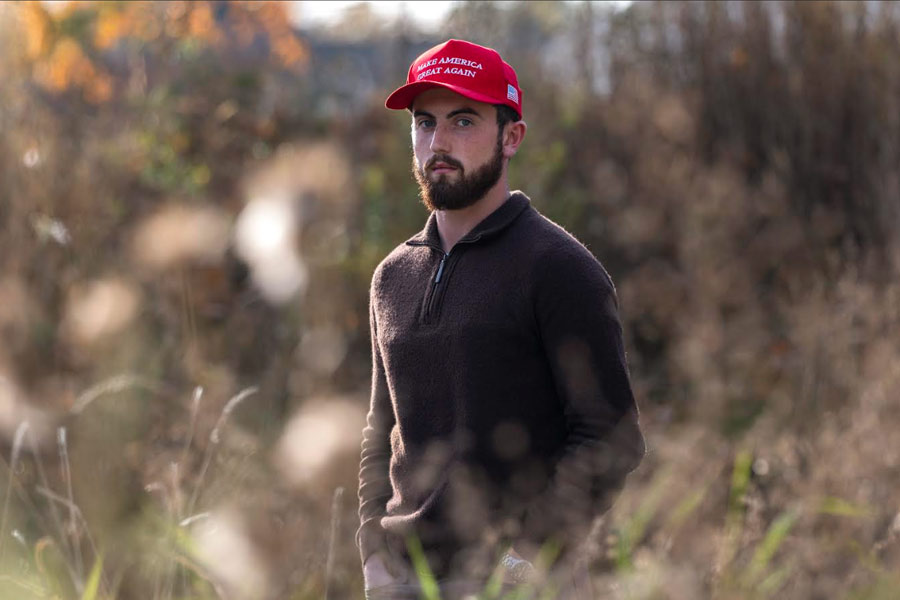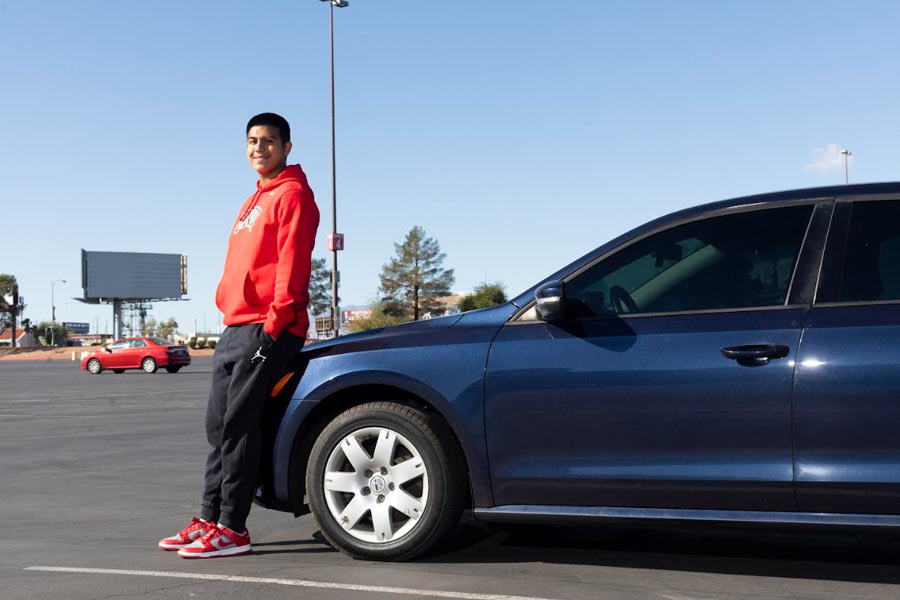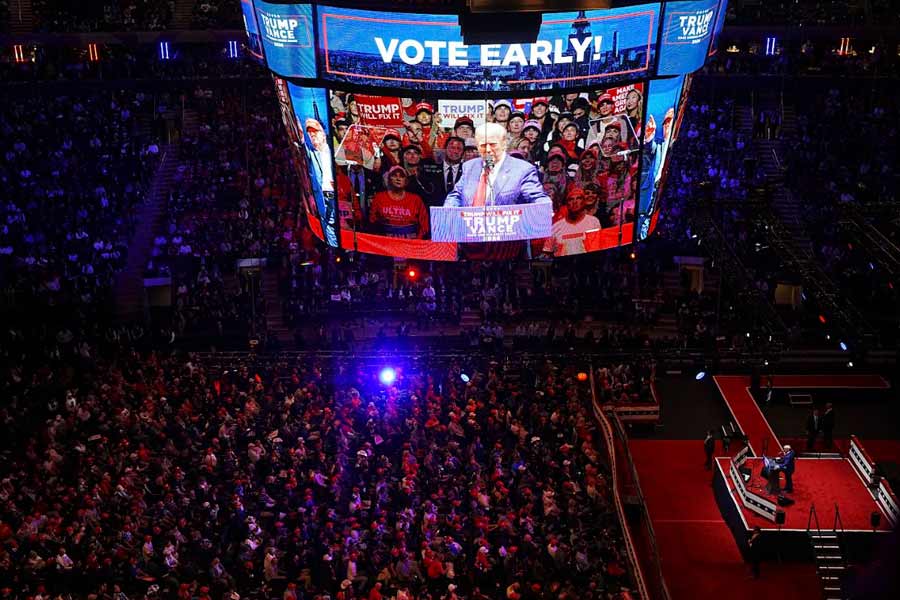Back in June, former President Donald Trump appeared on a podcast interview with wrestler and social media star Logan Paul. They chatted about immigration and the economy, but also about boxing and the existence of aliens — which Trump described as “very possible.”
Finn Murphy, a 20-year-old college student in Carolina Beach, North Carolina, generally stays away from politics. But when he listened to snippets of the podcast, he liked what he heard. That’s why, hair still wet from an afternoon of surfing, he was standing in line last week alongside people three times his age to cast a vote for Trump.
“He’s strong; he’s a man,” Murphy said. “I’m here to make sure he wins.”
Young men like Murphy have traditionally been among the least likely to vote in presidential elections. Campaigns and pollsters frequently struggle to reach them, because they are less prone than most to pick up the phone, trust institutions or participate in politics at all.
But in this election, Trump has made a concerted effort to court Generation Z men, especially white, Black and Latino men without a college degree, seeking out the podcasts and influencers they flock to and appearing on shows where he exhibits a bravado and disdain for cultural norms.
In recent years, young men have become more conservative and increasingly anxious about their economic status. In two national surveys conducted by The New York Times and Siena College recently, the gender gap among young Americans was stark, with young women backing Vice President Kamala Harris by 42 percentage points, and young men favoring Trump by 12 points. Trump is betting that he can harness all of this to motivate a wave of young men to vote on Election Day.
If successful, the gambit would be, perhaps, an even more surprising version of the feat Trump pulled off in 2016, when he persuaded a significant number of white, working-class and low-propensity voters to vote Republican for the first time. Young men without college degrees represent a greater challenge because past trends suggest they are unlikely to vote in large numbers. Pollsters and strategists from both parties said they were skeptical that 2024 would be any different.

Nick Kerkhoff, a football player and fraternity president at Carol University, in Waukesha, Wis., Oct. 28, 2024. Kerkhoff said former President Donald Trump’s economic agenda and a fear that Vice President Kamala Harris might get the country embroiled in a war that men would be drafted into led him to vote early for Trump. (Jim Vondruska/The New York Times)
“These groups that he’s targeting have generally been the least engaged politically and the least likely to vote,” said John Della Volpe, director of polling for the Institute of Politics at the Harvard Kennedy School who was an adviser to President Joe Biden’s 2020 campaign. “Having said that, Trump has a history of turning out groups like that, and we cannot underestimate that.”
In 2020, about 6.6 million men between 18 and 24 reported voting, according to U.S. Census Bureau population surveys. That’s about 4% of the 154 million who reported voting that year. In general, women vote at a higher rate than men across age groups, according to Debbie Walsh, director for the Center for American Women and Politics.
In interviews with two dozen young men in battleground states across the country, many said they admired Trump but questioned whether the outcome of the election would make a real difference in their lives — the kind of skepticism that makes political experts doubt that they will ultimately bother to vote.
In Phoenix, Alfonso Arribe, 21, said he liked Vice President Kamala Harris’ tax plans and promises of student loan debt relief, as well as her support for women’s rights. But he said he was unhappy with how the Biden-Harris administration had handled the economy and frustrated at how inflation had eaten into his paycheck from his job at a local community college.
In Trump, he said, he saw a man who said whatever he wanted and did not modulate his opinions for anyone.
“If I’m honest, both of them are bad,” Arribe said. “It’s just coming down to: What are they going to take away? Is it going to affect me badly?”
But some young men said they believed that Trump and the Republican Party would be better for the country — and for their demographic in particular.
Nick Kerkhoff, 21, a football player and fraternity president at Carroll University, in Waukesha, Wisconsin, said he had voted early for Trump, mainly because of his economic agenda and a fear that Harris might get the country embroiled in a war that men would be drafted into.
Kerkhoff and other young male voters said they felt unfairly written off by Democrats, with people assuming in social settings that they would be “inherently racist, misogynistic.”
“They’re making uneducated conclusions that hurt a large majority of people living in the country without even realizing,” Kerkhoff said. “For the longest time, the Democratic Party has been consistently known as the party of unity. And it doesn’t sound like that.”
Chasing an Elusive Group
In the past decade, men younger than 30 have confronted rising challenges, from stagnant wages to a decline in college enrollment and an epidemic of loneliness and a rise in suicide rates. At the same time, they have reported feeling increasingly left behind culturally and blamed for society’s ills.
“These have metastasized into grievances, and these grievances come to be exploited,” said Richard Reeves, a senior fellow at the Brookings Institution and the president of the American Institute for Boys and Men. While Democrats have rallied women around issues like restoring abortion rights, Reeves argued they have done a comparatively poor job of speaking to men — in some cases alienating them by suggesting they are responsible for society’s problems.
It is Democrats, strategists said, who have offered more specific policy proposals that might benefit young men, like assistance for first-time homebuyers. But they said Republicans were the ones speaking directly to this group.
“The vibe of the Republicans is, ‘We’re guys who like guys, and we like the things that guys like. We see you,’” Reeves said.
Trump has sought the support of such disaffected voters. He has bantered on a livestream with Adin Ross, an internet celebrity who has broadcast with avowed white supremacists and neo-Nazis, quizzed comedian Theo Von about drug use and played golf with a group of YouTube pranksters known as the Nelk Boys. He has surrounded himself with masculine sports figures like Dana White, CEO of the Ultimate Fighting Championship, and Hulk Hogan, the former professional wrestler. Courting Latino and Black men, Trump and his team adopted hip-hop imagery and slang.

Jonathan Marin, 18, between classes at the University of Nevada, Las Vegas, Oct. 29, 2024. Marin learned about the proposal by former President Donald Trump, the Republican presidential nominee, to eliminate tax on tips and liked it. He is promising to vote for the Republican candidate. (Mikayla Whitmore/The New York Times)
Last week, the former president recorded a three-hour podcast with Joe Rogan, the media behemoth with a large male audience.
Trump’s allies have also been present on college campuses to encourage young people — especially men — to vote. They have held events with Republican speakers, including Charlie Kirk, who heads the conservative group Turning Point USA.
Whether this will translate on Election Day remains an open question. The very factors that have drawn Gen Z men to Trump — disdain for traditional politics and a distrust of institutions — also make them less inclined to vote. A recent Harvard Youth Poll found that Harris leads among young men who are likely to vote, while Trump leads with those who are less certain.
Trump’s campaign feels confident.
“I think they have been low-propensity over the years because nobody’s ever talked directly to their concerns before in a way that resonates,” James Blair, the Trump campaign’s political director, said in a statement. “For the first time ever, a presidential candidate is acknowledging the issues that young men face.”
Tim Walz’s Bro Tour
Harris maintains a lead among young voters overall, and even with young men in some surveys. Her campaign said it had done more than Republicans to offer policies that would actually improve the lives of young men, such as a proposal that forgives business loans for Black-owned startups.
And the Harris operation has tried to reach them, pointing to advertisements on sports betting websites like DraftKings and Harris’ appearances on podcasts like “All the Smoke,” hosted by two former NBA players. The campaign said it has been active on college campuses, and Harris has been endorsed by celebrities popular with young men, like Bad Bunny, the Puerto Rican singer, and LeBron James.
Seth Schuster, a Harris campaign spokesperson, said Democrats were “competing hard for every vote,” while Trump seemingly had “no interest in building a winning coalition of voters” — citing the former president’s campaign event at Madison Square Garden in New York on Sunday, where speakers let loose a torrent of racist and misogynistic language.
Stopping by a Democratic voter information booth at Eastern Michigan University in Ypsilanti, Michigan, last week, Nicholas Hanser, 20, said he planned to vote for Harris because he feared the impact of a second Trump term.
“I think he wants to run it like a dictatorship and a monarchy, truly,” he said.
In recent weeks, the Harris campaign dispatched Gov. Tim Walz of Minnesota, Harris’ running mate, on something of a bro tour, sending him to football games and hunting for pheasants. On Sunday, he joined the Twitch stream of Rep. Alexandria Ocasio-Cortez of New York to play video games.
Still, some said the outreach felt inauthentic.
Rachel Janfaza, a researcher of youth political culture, said Democrats needed to directly address an issue she has heard repeatedly: Some young men no longer feel the Democratic Party is friendly to them, and Trump’s approach — blustery, profane and transgressive at times — has drawn them in.
Many in this cohort, Janfaza said, consider themselves politically moderate or liberal, supporting abortion rights and LGBTQ+ issues. But they also enjoy the less restrained humor on the right.
“Even if they disagree with Trump’s character, they appreciate the fact that he can get away with or say whatever he wants,” Janfaza said, “and it really flies in the face of this political correctness and culture they grew up with and have become frustrated by.”
The newfound Republican support among young men, however, will mean very little if they do not show up.
Jonathan Marin, 18, works as a busboy at a Las Vegas hotel and casino alongside his father, who immigrated to the United States from Mexico. On TikTok, he learned about Trump’s proposal to eliminate tax on tips, and he liked it.
Last Thursday, Marin, who is a student at the University of Nevada, Las Vegas, said he planned to vote for Trump on Saturday.
But when Saturday rolled around, he slept in, then got caught up with other obligations. “Things come up,” he said.
Still, he promised, he would eventually show up to the polls.
The New York Times News Service











